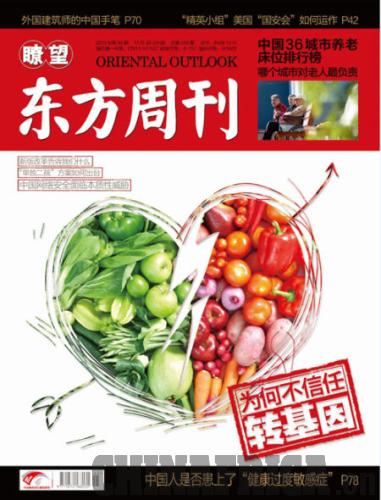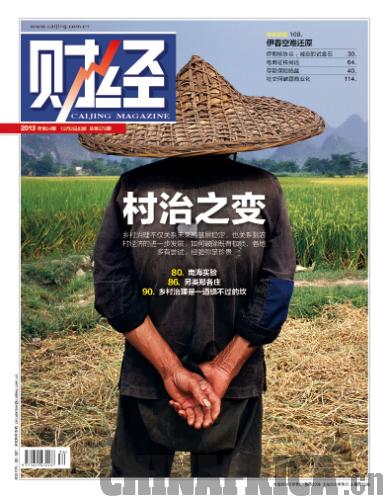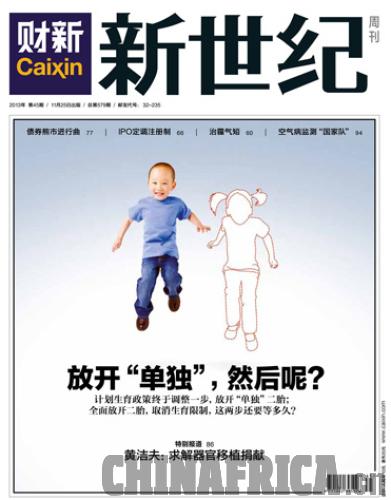| 
Trans-Genetic Food?
Oriental Outlook
November 28, 2013
Despite trans-genetic food supporters having a strong impact in scientific circles, people are increasingly after non-transgenetic foods at supermarkets.
An online investigation showed that more than 90 percent of Chinese think trans-genetic food is not safe and object to commercial cultivation of such crops in the country.
Since trans-genetic technology aims to benefit human beings, why does it suffer such objection?
A major reason is that in the past, scientists working on trans-genetic food only focused on technological success, neglecting food safety standards and public opinion. China's development of trans-genetic products currently lags far behind that of developed countries.
Apart from reliance on authoritative opinion, it is essential to explain the technology to the public so as to remove suspicion. New initiatives always create doubt. The government and media have done little to promote popular science and address public concern. Instead, some media have even spread unscientific rumors. It is high time for scientists to answer public questions.

Village Management
Caijing Magazine
December 2, 2013
The Third Plenary Session of the 11th Central Committee of the Communist Party of China (CPC) in 1978 launched rural reform. Accordingly, China's rural areas embraced a long period of prosperity.
However, in the past three decades, affected by rapid urbanization and industrialization, big changes have struck the rural economy. Agricultural collectives have expanded dramatically. Against this backdrop, unclear property rights related to collective ownership has increasingly become an obstacle to further marketization.
Currently, many villagers profit by renting out their land use rights, a business which has surged with rising land prices. Faced with big earnings, interest conflicts among various parties have become fierce.
The recently concluded Third Plenary Session of the 18th CPC Central Committee has set a goal to push forward modernization of the country's governance system and ability, with village management a key element.
Such management concerns stability in rural areas and can hopefully solve the longlasting problems in the rural area.

One-Child Policy Reform
Caixin
November 25, 2013
The Chinese Government further relaxed its population control policy by allowing families to have two children if one of the parents is an only child at the just-concluded Third Plenary Session of the 18th CPC Central Committee. Of all the decisions made at the meeting, this is the one most welcomed by ordinary Chinese citizens.
China's family planning program, also known as the one-child policy, has been strictly implemented for three decades, and is now finally relaxed. According to the plenary decision, the policy is aimed at promoting a long-term and balanced development of the Chinese population. This relaxation is regarded as the most reliable way to delay the aging of the Chinese society and maintain a reasonable labor size, without causing big fluctuations in population.
It has long been agreed that if the Chinese Government doesn't change the policy, China will accelerate its pace of becoming an aging society.
Actually, an aging population and labor shortages have already started impacting the Chinese economy. What's more, faced with the increasing life pressures, the young generation is less willing to have children.
Therefore, according to many scholars, China not only needs to relax the one-child policy, but also needs to further relax population control measures and even encourage the young generation to have babies.
Tobacco Production Doubled
Global Times
December 5, 2013
Cigarette production in China has almost doubled since the nation signed an international agreement to curb tobacco, meaning that the nation is only paying lip service to tobacco control legislation, according to a report.
The report, Tobacco Control in China from a Civil Society Perspective 2013, compiled and released by the Beijing-based think tank Research Center for Health Development, found that around 2.175 trillion cigarettes were produced in the year leading up to October.
In 2002, before China signed the World Health Organization Framework Convention on Tobacco Control in 2003, annual cigarette production was 1.75 trillion, but it rose to 2.58 trillion by 2012.
The tobacco industry in China is a large contributor to fiscal revenue. In 2012, it paid a total of 864.9 billion yuan ($141.9 billion) in taxes and handed 716.7 billion yuan ($116 billion) to the state treasury.
Suo Chao, a spokesperson of the Chinese Association of Tobacco Control, said China has made efforts to enforce anti-smoking regulations, with several provinces expanding their bans in more public places and multiple hospitals setting up smoking cessation clinics to help smokers.
|